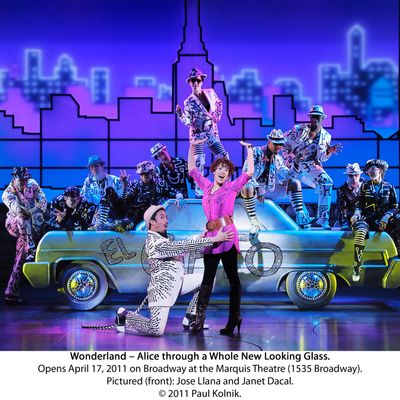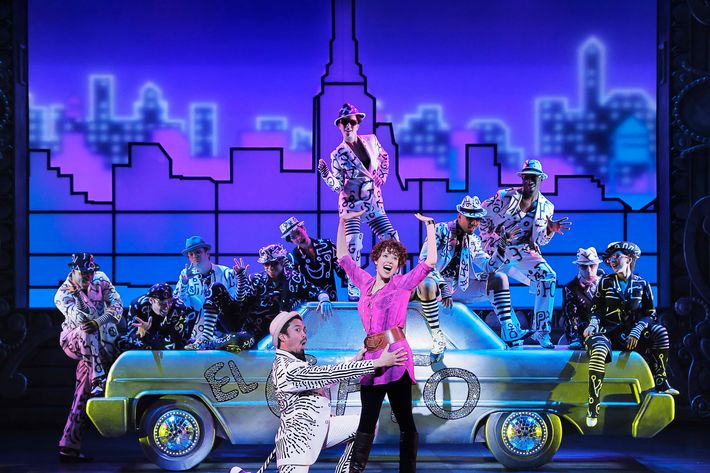

Alice’s Adventures in Wonderland was written by a sad, stuttering mathematician named Charles Lutwidge Dodgson, who published under the name Lewis Carroll and dedicated his masterpiece to the underage girl with whom he’d fallen in love. He filled the book with number puzzles and logic traps meant to illustrate the smug arbitrariness of the adult world. I wax pedantic here only because I found myself running the numbers during Wonderland, the latest agglomeration of pseudomusical refuse from composer-manque Frank Wildhorn: What’s been spent here, in talent and treasure? How many excellent performers were tied up in this strange, sloppy enterprise? How much life force, in total, has this show subtracted from the world? It brought to mind the Mock Turtle’s four branches of math: Ambition, Distraction, Uglification, and Derision.
Wonderland is the worst kind of nonsense, the sort that attempts little and achieves less. Turgid with its own emptiness, this unctuously charmless show is proof that nothing from nothing somehow equals less than nothing. Its clone-songs, pop-cultured in the shallowest of Top 40 petri dishes, are all one-touch samples of erstwhile hits, most of them (weirdly) from the nineties. (Boy bands? Marc Anthony? No “ironic” cutaway or wink is too dated for this show—even by Broadway’s forgiving standards. It sounds piped-in from Hell’s very own lite-FM station.) The story, meanwhile, seems designed to frack out any stubbornly sticky soul-matter the music hasn’t already corroded away from your innermost chambers. Nominally a Hook-like revision of the Carroll tales—centering on a harried modern mom named Alice (Janet Dacal) who must travel back to Wonderland to relocate her youthful optimism—the narrative is just an excuse to plant us in a tacky, crass, not-so-vaguely creepy new version of Alice’s fantasy world. This is a “grown-up” Wonderland, which apparently means it’s designed like a mid-budget Miami swing club: The Mad Hatter has been replaced by a similarly chapeau’d villainess (Kate Shindle) in steampunk fetishwear that’s practically still got the Ricky’s receipt hanging from the bustier; the Queen of Hearts has apparently developed a strange ass fixation to go with her axe fixation. (Herewith, a sample of Jack Murphy’s stunningly puny lyrical prowess: “I’m almost never never all quite there / Noblesse oblige—my derriere.”) Each beloved character has been “updated”: The Cheshire Cat (Jose Llana), now called “Che,” is now a Latin-pop star with a rim-spinning hoopty and Ricky Martin-era song stylings. (Again: I use the word “updated” loosely.) The Caterpillar (E. Clayton Cornelius) calls himself “Puff Caddy.” Hilarious, no? (I stress: The performers are doing all they can to save this stuff. It’s just not saveable.)
Meanwhile, bookwriter-director Gregory Boyd’s story bends itself in bizarre torsions, trying to prove that there’s something to grab hold of. Mindful of the Wicked audience he’s trying desperately to seduce—sometimes with nudge-nudge references to the show itself—Boyd and co-librettist Murphy lard the script with fussy, unnecessary detail: succession battles, eleventh-hour gestures to Carroll’s chessboard schema, assorted magical gobbledygook, and lots and lots of talky, weak banter. But the characters simply aren’t well-drawn enough to support any of this, and the villainess—Shindle’s power-sneering, vaguely kinky neo-Hatter—is to pure evil what Velveeta is to pure cheese. (She drives a piece of Victorian construction equipment, and her lair—why, exactly, does she need a lair?—looks like the set of the original Tron. Forget “why is a Raven like a writing desk?” My only question is “WTF?”) But all of this twaddle is nothing more than the Styrofoam packing for all those ultrathin Wildhorn pastiches, some of which are elevated far above their desert level by the performers. (The Backstreet Boys gloss “One Knight,” in particular, succeeds beyond even its creator’s wildest dreams: I’ve never heard an audience clap harder for four otherwise faceless chorus members.) Verily, Wildhorn is the Chuck E. Cheese of musical theater.
All of this would be (somewhat) forgiveable, if it weren’t for the general ick factor of the whole venture: The childworld has ended up polluted, the adult world reduced to a series of in-joke smirks. Somehow, Wildhorn and company have taken a rapturous children’s classic written by a confirmed pederast and turned it into something dirty, or maybe just distasteful. The subliminal message, if there was one, read to me as “Molest Your Inner Child.” Meanwhile, I’m thinking, “You stay on your side of the looking glass, Frank Wildhorn, and I’ll stay on mine. Hands where I can see them.”
At the Marquis Theatre, 1535 Broadway.




